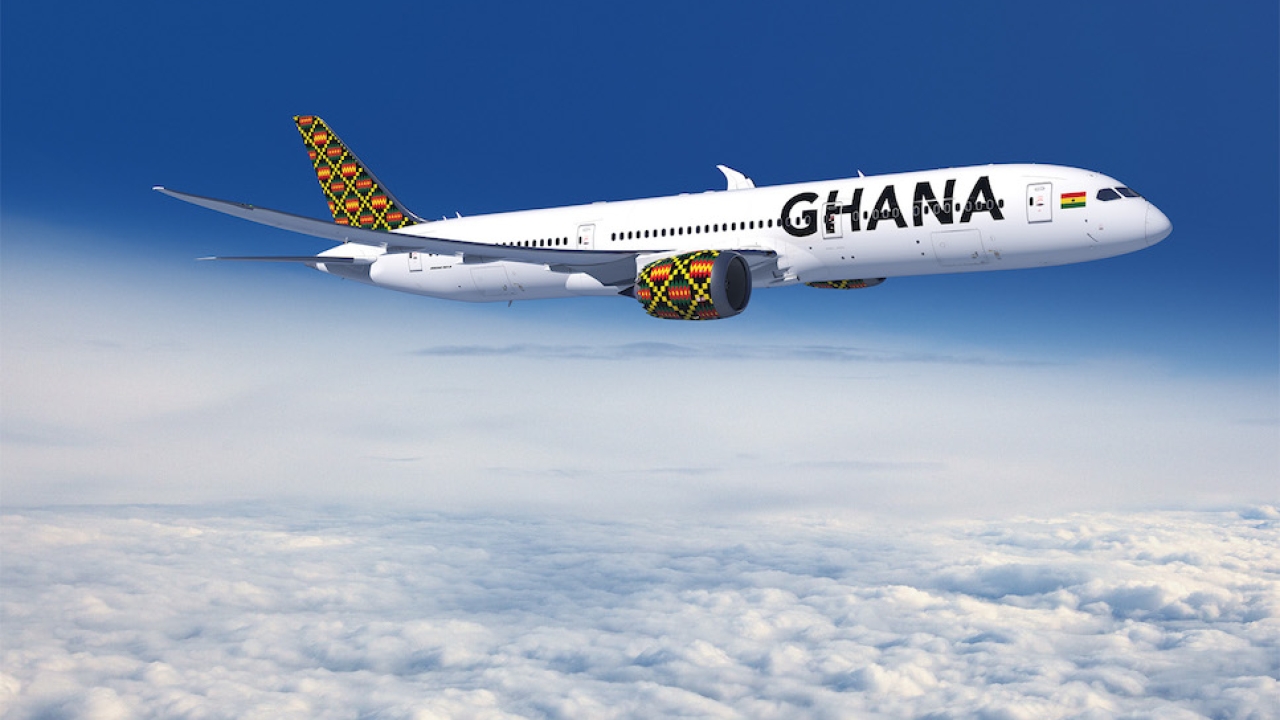Trouble in store for Ghana's new flagship?
The Ghanaian Government has named the successful bidders to create a new national airline, but doubts remain in some quarters over the plans.

Up in the air: The only image of the planned new airline was issued by Boeing when it received a tentative order for three 787s. However, it appears that there are now plans to switch to Airbus equipment. Picture: Boeing.
For some years now, Ghana has hosted ambitions to be an aviation hub for west Africa. Part of that ambition involved the creation of a new flag-carrier.
Plans for the creation of a new national airline in Ghana have taken a step forward with the Ghanaian Government awarding start-up, Ashanti Airlines, and financial backers, Zotus Group, a tender to begin operations later this year.
The airline, to be known as Ghana Airlines, is planned to start operations with domestic and regional routes, with long-haul services to destinations including London Heathrow and New York to follow.
The country has been without a national airline since the collapse of Ghana International Airlines in 2010. Plans for a new flag-carrier have been bounced around for several years, with Ethiopian Airlines and EgyptAir mooted as potential strategic partners for the new airline.
Ethiopian, Africa’s most consistently successful national airline, was touted as the most likely partner and the Egyptian Government was in talks with its Ghanaian counterpart from around the time of the 2019 Dubai Airshow.
However, both have apparently fallen by the wayside and the announcement of the successful bidders came as something of a surprise.
“The time has come to return Ghana to the aviation map,” said Ghanaian Transport Minister, Kwaku Ofori Asiamah, when announcing the contract award to Ashanti and Zotus.
“Learning from past experiences and following best practices within the aviation industry, it is best to collaborate with the private sector.”
Ashanti Airlines is a subsidiary of the country’s Despite Group conglomerate and, at the time of writing, had yet to be awarded its airline operator’s certificate (AOC) by the country’s aviation regulator.
UK-based Zotus Group describes itself as “an organisation dedicated to the development of humanitarian projects and transforming Africa and third world countries”, with a portfolio spanning areas such as hydrocarbons, manufacturing and agriculture.
It was co-founded by former England international soccer player, Emile Heskey, and business development specialist, Davison Simango.
Attempts to contact Ashanti Airlines through the Despite Group were unsuccessful.
However, Zotus’ Simango, speaking in early February, said: “We’ve been working with Ashanti throughout the whole tender process. In a month or two the GCAA will issue the AOC.”
He declined to give details of the funding, beyond describing it as “a significant amount”. Asked if there were still plans to bring in an experienced external strategic partner, he replied: “If there’s a deal on the table, yes, but at the moment we’re solid with the partnership we have with Ashanti.”
At the 2019 Dubai Airshow, the Ghanaian Government struck tentative deals with Boeing and De Havilland Canada for three 787-9s and “up to six” Dash 8-400 turboprops. However, the deals are not believed to have been finalised. Boeing declined to comment on the status of the order.
According to Simango: “We’re not part of whatever deal was made previously. We’re looking at completely different aircraft – Airbus A320s and A330s.”
One Ghanaian airline executive, speaking on conditions of anonymity, expressed reservations over the deal. He said Ashanti had been trying to get its AOC for six years and that his understanding was that the government had made possession of an AOC a prerequisite of being awarded the contract to set up the new national airline.
“My understanding from Ghana CAA is that… they were given instructions by government to help Ashanti produce the [operating] manuals. The CAA was not willing to compromise its standards. The government then said, ‘Right, if you won’t compromise, sit with them and help them with it’.”
He added that Ethiopian had dropped out of the picture because the then CEO, Tewolde GebreMariam, had had previous experience of losing a deal to be a strategic partner with the country’s previous flag-carrier, Ghana International Airways.
Wary of similar disappointment, he asked for cast-iron guarantees that Ethiopian would have full control of the new airline. The Ghanaian Government balked at his demand and the deal fell through.
Additionally, plans to have EgyptAir as the strategic partner fizzled out after the Egyptian official driving the deal died of a heart attack and the Ghanaian aviation minister behind the deal decided not to stand for re-election, “so everyone connected with the project faded away”.
Stay up to date
Subscribe to the free Times Aerospace newsletter and receive the latest content every week. We'll never share your email address.


